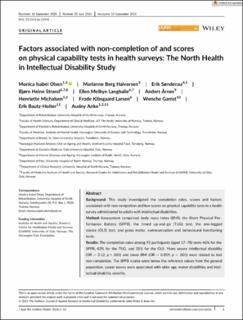Factors associated with non-completion of and scores on physical capability tests in health surveys: The North Health in Intellectual Disability Study
Olsen, Monica Isabel Benedikte; Halvorsen, Marianne Berg; Søndenaa, Erik; Strand, Bjørn Heine; Langballe, Ellen Melbye; Årnes, Anders; Michalsen, Henriette; Larsen, Frode Kibsgaard; Gamst, Wenche; Bautz-Holter, Erik; Anke, Audny
Peer reviewed, Journal article
Published version

Åpne
Permanent lenke
https://hdl.handle.net/11250/2829755Utgivelsesdato
2021Metadata
Vis full innførselSamlinger
- Institutt for psykisk helse [1312]
- Publikasjoner fra CRIStin - NTNU [38688]
Originalversjon
JARID: Journal of applied research in intellectual disabilities. 2021, 1-12. 10.1111/jar.12942Sammendrag
Background This study investigated the completion rates, scores and factors associated with non-completion and low scores on physical capability tests in a health survey administered to adults with intellectual disabilities. Method Assessment comprised body mass index (BMI), the Short Physical Performance Battery (SPPB), the timed up-and-go (TUG) test, the one-legged stance (OLS) test; and gross motor, communication and behavioural functioning tests. Results The completion rates among 93 participants (aged 17–78) were 46% for the SPPB, 42% for the TUG, and 31% for the OLS. More severe intellectual disability (OR = 3.12, p < .001) and lower BMI (OR = 0.859, p = .001) were related to test non-completion. The SPPB scores were below the reference values from the general population. Lower scores were associated with older age, motor disabilities and intellectual disability severity. Conclusions Including physical capability tests in health surveys among adults with intellectual disabilities is important to monitor functional status and guide prevention strategies.
